
‘They became warriors’: Reflections from the front lines
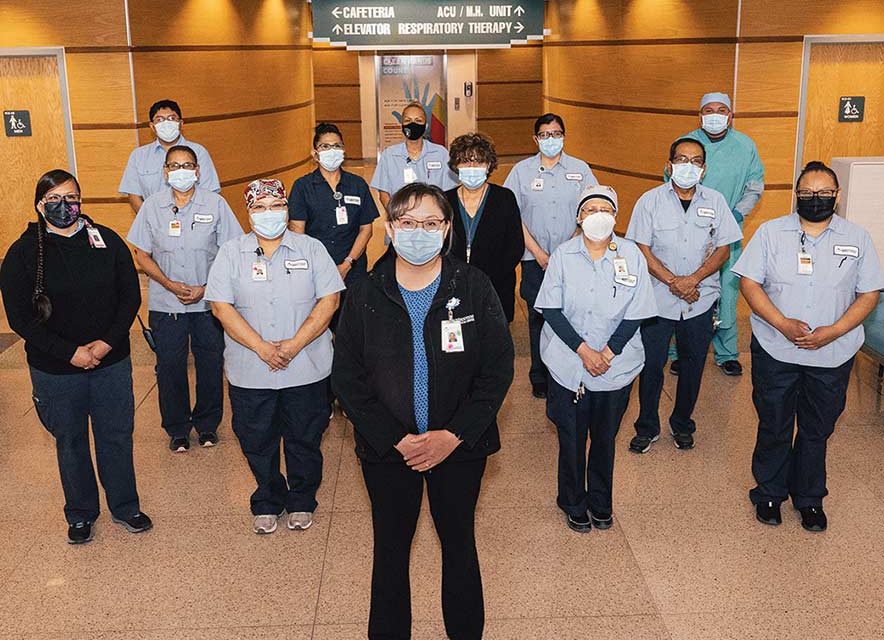
Courtesy photo | FDIHB Marketing Dept.
Front, Corinne Legah, environmental service supervisor with her staff, including: back row, left to right, Ty Spencer, environmental service technician; Maryella Duboise, environmental service technician; Carenda Greyeyes, environmental technician; and Sebastian Larsen, environmental service technician; middle row, left to right, Inez Lee, environmental service technician; Winona Larsen, fabric worker; Gloria Malone, administrative assistant; and Nelson Blackgoat, environmental service technician; and, front row, left to right, Della Albert, environmental service technician; Sharon Peterson, environmental service technician; Colleen Begay, environmental service technician; and Joanna Russell, fabric worker.
Tséhootsooí Medical Center workers share experiences
Wilberta “Billy” Jackson, public health nurse III
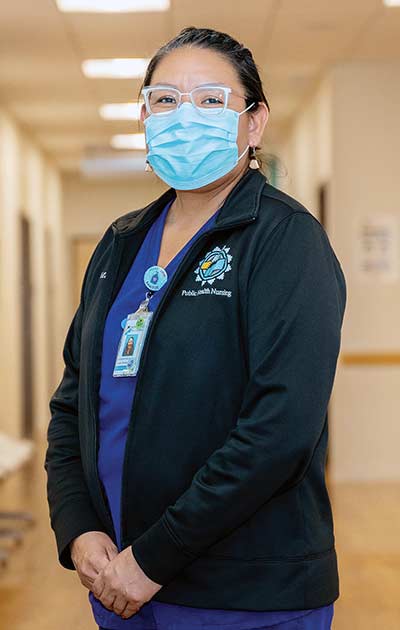
Courtesy FDIHB Marketing Department
Wilberta “Billy” Jackson, registered nurse and Public Health Nurse III.
This pandemic has been the longest roller coaster of stress, grief, and loss. I’ve kept my routine simple – sleep, eat, and exercise. And, more sleep.
This has been and will probably be the most challenging time of our lives. I could focus on all the bad, but so much good has come from this, from community members stepping up, leaders rolling their sleeves up and getting dirty, how we came together to care for our elders, and so much more.
Professionally, we’ve adjusted and readjusted a million times over and completely changed how we deliver health care. We’ve had information, guidance, and policies being added or changing every day and we still were able to deliver health care in a safe, efficient manner.
At the beginning of the pandemic, our leaders were warning everyone about the health care system being overwhelmed. Most people thought about it in terms of hospitals running out of beds, but they didn’t think of it in terms of how an underfunded and shorthanded public health force would respond to a pandemic in a rural area with limited resources, and where a population’s most basic physiological and safety needs are not being met.
When you don’t have access to clean water, food, shelter and security, you’re not able to prioritize prevention measures until your basic human needs are addressed.
The resiliency of the Diné people is unrivaled.
The days I’m struggling or feel like giving up, I hear my grandmother’s words, and that’s what keeps me going. And my mother’s surprise delivery of Navajo soul food meals.
I’m a public health nurse, so it won’t come as a surprise that I’m excited about the COVID vaccines. We’ve already seen a substantial decline in cases, hospitalizations, and deaths, so we know it’s working.
My hope is that our response to the next pandemic or health care crisis won’t be complicated by politics, lack of national strategy, lack of preparation, and misinformation.
Stacey Burnside, Primary Care registered nurse
What I have learned from this pandemic is to cherish every day and every person that you love.
COVID-19 has impacted my family and me profoundly. I lost an uncle and an aunt to COVID-19, and to this day, it is surreal that they are gone.
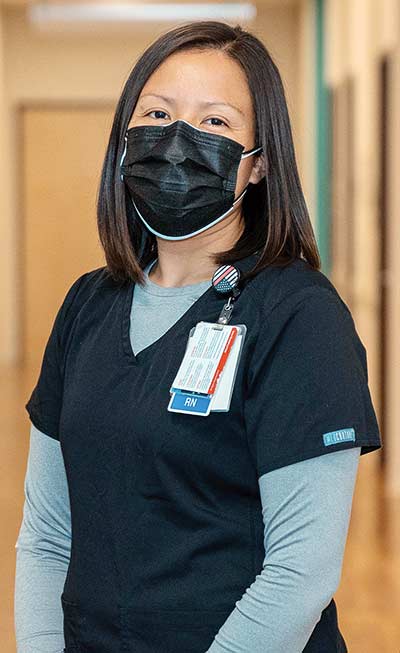
Courtesy photo | FDIHB Marketing Dept.
Stacey Burnside, primary care registered nurse.
As a primary care nurse, it is difficult to hear about losing a patient to COVID-19, and at the peak, it was almost a daily occurrence…
The challenges that I faced during this pandemic were adapting to the changes in work roles and being separated from the people I love. The clinic that I worked in was closed when the pandemic hit the first peak, and I, along with my coworkers, was informed that we had to work in the Emergency Room.
The moment that I saw a patient who needed me to be their nurse, despite having COVID-19, humbled me. That moment in the ER humanized COVID-19 for me and made me realize that I was put there for a reason. No matter what the situation is, nurses adapt, and the teamwork and strength we draw upon each other are phenomenal.
A huge hit to me personally and professionally was losing a friend to suicide … dealing with grief, loss, and stress has been a daily thing.
What has helped me is drawing strength from my God, husband and son, and family. There are many negatives to the pandemic, but one positive that many have seen is the love and strength we have found among our families.
I am thrilled that we are at a point of a high vaccination rate in the Navajo Nation. I remember when I administered my first COVID-19 vaccine to a patient, it brought tears to my eyes, and I cried after work.
Leah Chattin, respiratory therapist
I’ve been a respiratory therapist since 2003. What I experienced throughout the first surge of COVID-19 here on Dinetah is not what you prepare for.
I see the impact on my life as deep internal scars that I buried and to resurface those experiences is a nightmare. Imagine the inability to fully take a deep breath, something so simple we take for granted.
Supporting my patients with breathing treatments, providing chest physical therapy, changing breathing devices constantly because the demand for oxygen escalates all in a 12-hour or more shift.
All these specialized techniques to avoid the last option of intubation, allowing an artificial airway introduced to your trachea with an opening at the tip to provide mechanical breaths from a mechanical ventilator.
Fear expressed from my patients was a frequent emotion. You are alone, isolated from your family, your loved ones, no familiar face to embrace, to celebrate your improvement or the worst, a decline despite the battle you have endured. I’d remind my patients not to give up…
Instinct took over because I’m a mother too, a nurturer. I can remember softly stroking their hair, holding their hands, shedding tears, praying, putting myself in that empty place at bedside where your family should be gathered, processing the grief. Accepting loss was tremendously difficult.
I lost myself because I did not decompress my emotions. My spirit slivered away slowly each time my patients faced rejection of our efforts to sustain life.
How I endured and sustained my sanity was prayer requests. Prayer was undoubtedly my saving grace.
This virus is fluidic, the path it took was unpredictable. I strongly believe we need to continue wearing a mask, following the CDC guidelines and begin or sustain our health and wellness.
Putting into words my experience was not an easy effort, however it’s a pathway for healing. Every COVID patient I battled for will forever have a place in my heart.
Sandra Fouser, nurse executive of the Primary Care and Specialty Clinics
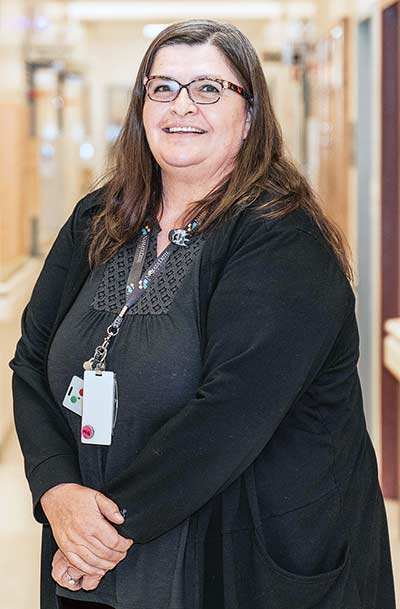
Courtesy photo | FDIHB Marketing Department
Sandra Fouser, nurse executive, Primary Care Clinic and Specialty Clinics.
Seeing the virus cross the ocean and hit the heart of the Navajo Reservation forever changed our lives. As a health professional, I knew venturing into the unknown with limited protection meant some would survive and some wouldn’t.
What I have learned working on the front lines – compassion, cohesiveness, companionship, strength, sadness and mental stress. We have been battered, beaten, praised, comforted and have also received recognition from all walks of life.
I am proud to be a nurse.
I believe the strength to endure comes from resiliency and the people we work with and the support of our families at home. As nurses, we cannot stand still. I feel it is in our blood to help and move forward.
I have lost friends, coworkers, relatives and patients. The grief I feel is palpable, almost more than I can handle. Seeing my family, staff and patients suffer through illness and grief has been very challenging and heartbreaking.
As a team, I believe when something happens to one of us, we all feel the effects, we grow closer and find comfort in each other.
I see the vaccine as a progression toward eradicating the detrimental effects of this virus and giving us hope that there is a better tomorrow and that Hózhó will be restored.
Dr. Karen Williams, hospitalist physician
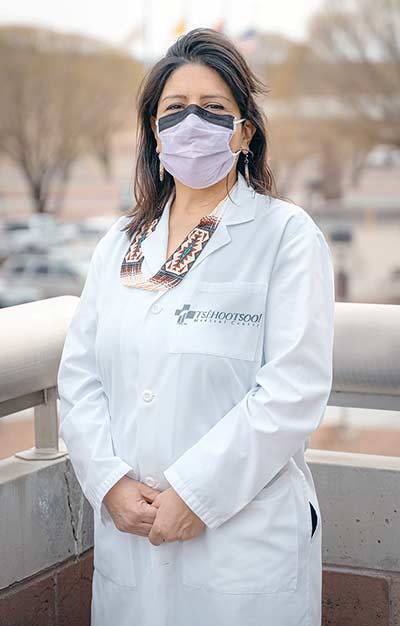
Courtesy photo | FDIHB Marketing Dept.
Dr. Karen Williams, hospitalist physician at Tsehootsooi Medical Center.
I am a Native physician (Mountain Maidu/Apache) and Indian Health Service Professional Scholar.
When the pandemic started our hospitals were suddenly overwhelmed with large numbers of very ill patients needing oxygen. Some patients who worsened were placed on a “life support” or ventilators since they could no longer breathe on their own.
Despite our best medical management efforts, including use of high-flow oxygen, there were patients who did not survive.
I witnessed more death in a year than I have ever experienced in my career. This was traumatic for me because every day I came to work I felt like I was coming into a war zone.
We saw people struggling to breathe and fighting for their life. We heard family members saying their goodbyes to their loved ones and crying over the phone. We held hands of those who took their last breath and witnessed co-workers not able to control their tears.
If it were not for our team efforts, almost a military-style mentality, we could not have managed.
As a hospitalist physician, the biggest challenge was ensuring that I had the most up-to-date medical knowledge to save a patient’s life. During the beginning of the pandemic many doctors throughout the country did not feel prepared. This was quickly overcome by learning medical strategies used by doctors throughout the world.
The treatments used included steroids, anticoagulant medications, and high-flow oxygen. We had the support of our hospital’s incident command leadership and adapted to the changes. This included being able to offer our patients who needed oxygen a federal Drug Administration-approved “emergency use” medication called Remdesivir, and more recently Bamlavinimab for non-hospitalized patients
My experiences on the front lines were psychologically and physically overwhelming … I sought support from elders and used my Native spirituality for strength. I also sought protection support from traditional Indian practitioners who set up a tipi and hogan outside the hospital for employees.
I sometimes thought twice about the danger I was in. However, I acknowledged that I would never walk away. This is a result of my obligation to the Native community and the hundreds of patients I had gotten to know for so long. I “warriored up” in my mind and sought to do the best I could.
I do not foresee an end to mask wearing, and now recognize how careful we all must be to protect each other. I saw too many elders get severely ill and even pass away from COVID as a result of young family members not being careful and bringing it home.
I have encouraged community members and my own family to get the vaccine as soon as possible. I received two doses of the Pfizer vaccine and said a prayer in my Native way each time for protection.
Natasha Topaha, certified medical assistant, Mobile Unit
Overall, this year has been extremely challenging, but also has reinforced my personal strength and resiliency. I have had ongoing concerns throughout the epidemic regarding my kids’ isolation and their mental health.
It has been difficult, but doable, to manage both working in health care and supporting my family both emotionally and physically. I had constant worry about bringing the virus home and infecting my family given that I was working in high risk areas and providing COVID testing, vaccines and social and mental health support to patients.
I found that doing outdoor activities with my family, such as bike riding and hiking, helped me ease my stress and helped teach my children some healthy coping skills. And we could spend time together!
I feel very happy and grateful in both receiving the vaccine and being able to provide it to patients and the community. I feel safer at work and at home now.
Johnny Willeto Jr., facility manager/logistics chief
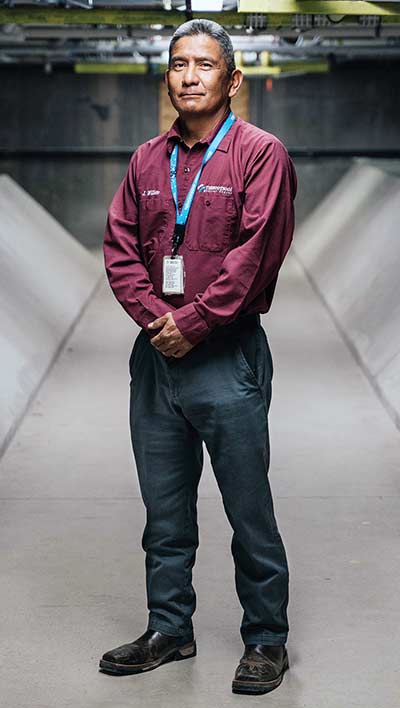
Courtesy FDIHB Marketing Dept.
John Willeto Jr., facility manager/incident command logistics chief.
The strength to endure comes from within yourself. For me this began in my childhood as the son of Delphine Damon Willeto and Johnny Willeto Sr., who nurtured me to become a great human being. They taught me to be a courageous, productive worker and know my limitations.
As a facilities manager, my main focus and responsibilities are the protection in the physical environment of all who walk through the doors of Fort Defiance Indian Health Board’s facilities.
All we knew is that COVID-19 was airborne and surface communicated. I treated it as you would tuberculosis and ensured that my staff had adequate PPE to help protect them when they are tasked with working in the patient care areas.
This responsibility was a big challenge when trying to procure medical equipment such as masks, gloves, safety glasses, gowns, scrubs, and so forth.
Having an MBA has allowed me to flourish in this high stress environment and to adjust with adaptations to finding supplies and creating new relationships with trustworthy suppliers.
Being in close proximity to patients who are struggling with getting well can be heart wrenching.
Being able to fulfill my duties in the support role to the best of my ability for my community and teammates has allowed me to sleep well at night knowing that I gave it my all.
I have lost a brother-in-law who contracted the virus in the Scottsdale area of Arizona.
These were very difficult times because as Navajos we are accustomed to comforting each other by a hug or handshake. With COVID, gatherings are not safe, so having family meetings for planning the funeral is off and also the funeral usually consists of 10 minutes before the burial with only a few close family in attendance.
One of the biggest assets I have gained is the spiritual belief in God and keeping the communication open by saying my prayers often – to be thankful for the blessings that have come my way or when asking for strength to endure the hardships.
In my free time I isolate on the Willeto Sheep Ranch in Goatsprings Valley, Arizona, where I tend 120 sheep and goats. Being able to separate the everyday stress and recharge is paramount to going forward with courage and mental sharpness to make the right choices for the organization, patients and employees.
The vaccines are an effective tool to help reduce the mortality of the virus on us and give us protection to this invisible enemy.
Corinne Legah, Environmental Service supervisor
Personally, I was scared when I first heard of the spread of the virus overseas. It was shocking how fast the virus traveled.
In the beginning our team was needed to help keep the hospital sanitized and safe for patients. We reinforced training on the cleaning process for the airborne/droplet virus. I constantly stressed wearing PPE and hand washing.
I am so proud of the team for stepping up by protecting our patients. They became warriors to fight the virus.
I believe without my husband’s support and God I would not have been able to cope. I have lost friends and family from this virus. It saddens me that many of our people are now in the spirit world.
Being a Native and growing up with Navajo beliefs, I had to be strong. My ancestors went through so much and our people are resilient. Prayer is our strength.
I cried when I watched the news when the vaccine was given to the first person in the U.S. If everyone gets their vaccine we will be able to interact with family again. I am looking forward to that day!
As a public service, the Navajo Times is making all coverage of the coronavirus pandemic fully available on its website. Please support the Times by subscribing.
How to protect yourself and others.
Why masks work. Which masks are best.
Resources for coronavirus assistance


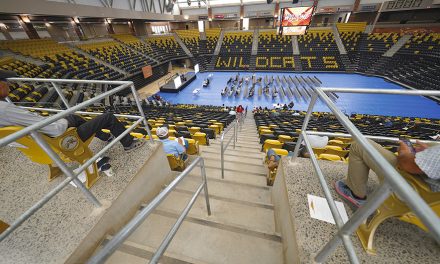




 Highway 264,
Highway 264, I-40, WB @ Winslow
I-40, WB @ Winslow